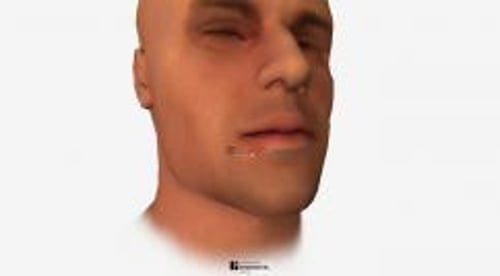There are 8 different types of herpesvirus. Even though herpes simplex is only one of those types, most people just call it "herpes."
What are herpes simplex virus (HSV) infections?
Herpes simplex is a viral infection that causes a rash of small, painful blisters that turn into open sores. The sores go away, but the virus stays in your body for the rest of your life. The virus can become active again and cause more sores.
HSV infection usually causes sores on your mouth or genitals but sometimes infects other areas of the body, such as the eyes, fingertips, and rarely brain
The virus is spread by touching, including by sexual contact and during birth if the mother's vagina is infected
HSV infection can be deadly in newborn infants and people with AIDS
When you have an outbreak of herpes, antiviral medicines may lessen your symptoms and make them go away sooner
Using condoms during sex can help prevent spreading herpes to others
What causes HSV infection?
There are 2 types of herpes simplex virus. Both are spread by physical contact with an infected person.
Herpes simplex virus spreads very easily, including through:
Touching
Kissing
Having sex
Sharing things such as towels or razors with an infected person
You're more likely to get herpes from someone if they have sores. However, infected people can sometimes spread the virus when they don't have sores.
If you're pregnant and have herpes in or around your vagina, you may give the infection to your baby during birth even if you don't have sores.
What are the symptoms of HSV infection?
Most people have either:
Oral herpes, which affects your lips or inside your mouth
or
Genital herpes, which affects your genitals, including the penis, the skin outside the vagina, or the inside of the vagina
Oral herpes
Symptoms of a first infection include:
Many painful sores in your mouth, which last 10 to 14 days and can hurt so much you don’t want to eat or drink
Sometimes, a fever, headache, or body aches
When the virus becomes active again:
First, you'll feel itching, burning, or tingling on your lip
Then, one or more sores will form at the edge of your lip, usually in the same spot with each outbreak
The sore will quickly form a crusty scab that falls off after about 8 to 12 days
The lip sore is sometimes called a “cold sore” or “fever blister” because it’s often triggered by colds or fevers.
If you get sick easily or have a weak immune system, you may get sores that grow bigger and take weeks to heal. See your doctor as soon as you can.
Genital herpes
Symptoms of a first infection include:
Many painful sores in and around your vagina, penis, or anus
In women, the sores are sometimes inside the vagina—these are usually less painful than sores outside of the vagina
Fever or feeling sick
Burning when you pee
Trouble peeing or passing stool
When the virus becomes active again, you may have:
Tingling, itching, or aching around your vagina or penis
Within a few days, painful blisters in these areas
The blisters usually go away after a week. If you get sick easily or have a weak immune system, you’ll get sores that grow bigger and take weeks to heal. See your doctor as soon as you can.
Herpes in other areas
Finger: Swollen, red, painful fingertip (herpetic whitlow)
Eye: Painful sore on the clear front part of the eye (cornea), with tearing, sensitivity to light, and blurred vision (herpes simplex keratitis)
Brain: Confusion, fever, and seizures from a serious brain infection (herpes encephalitis)
Newborns who got infected with herpes during birth (neonatal herpes simplex) usually get sick before they're 4 weeks old. They may have sores all over their body. Sometimes the virus infects their brain, causing seizures, coma, and death. Herpes in newborns is dangerous and life-threatening. Even with treatment, many babies die.
DR P. MARAZZI/SCIENCE PHOTO LIBRARY
How can doctors tell if I have HSV infection?
Doctors can usually tell if you have an HSV infection, including oral herpes or genital herpes, based on your symptoms. To tell for sure, they may:
Send fluid from a sore to a lab for testing
Do blood tests
How do doctors treat HSV infection?
Doctors can't cure HSV infection, but antiviral medicine can help your symptoms go away faster.
Antiviral medicines work best when you take them at the first sign of tingling or discomfort, before blisters appear
If you get painful sores often, doctors may have you take prescription antiviral medicine every day (suppressive therapy)
If your eye is infected, an eye doctor (ophthalmologist) will give you antiviral eye drops
To help you feel better, doctors may suggest you:
Use an anesthetic cream or ointment to help your sores feel better
Take pain medicine (for example, acetaminophen or ibuprofen) if your sores really hurtTake pain medicine (for example, acetaminophen or ibuprofen) if your sores really hurt
Wash the area gently with soap and water
Put ice on your sores
How can I prevent spreading oral or genital herpes?
To prevent spreading oral herpes, if you have tingling or a cold sore:
Don’t share a drinking glass
Don’t kiss people or have oral sex
Don’t let someone touch your sore
To avoid getting or spreading genital herpes:
Wear a condom every time you have sex
However, because herpes may infect genital areas that aren't covered by a condom, condoms don't completely protect you.
Remember that you may still be able to spread herpes to other people, even if you don't have symptoms.
Drugs Mentioned In This Article




